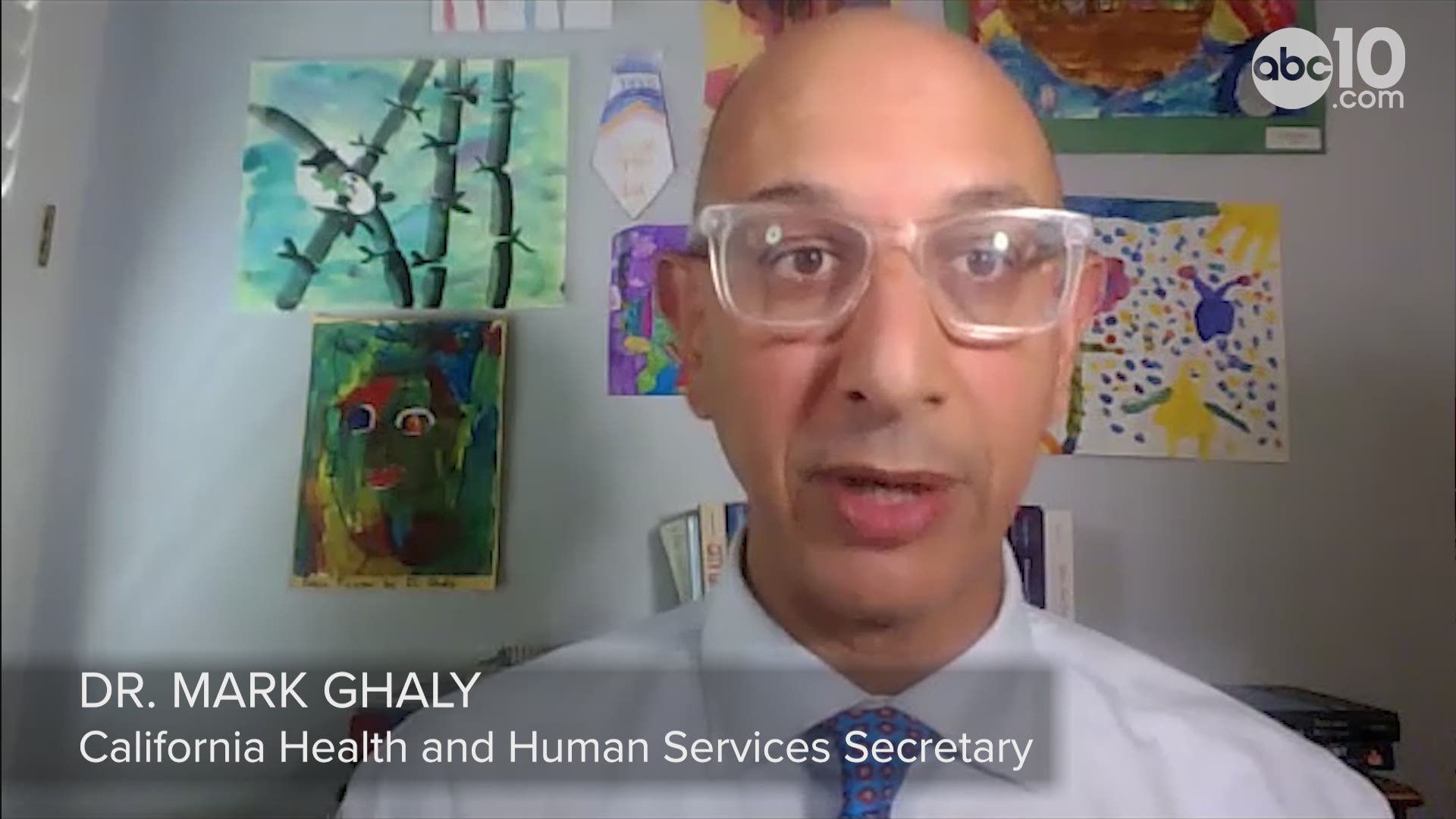CALIFORNIA, USA — Dr. Mark Ghaly, secretary of California's Health and Human Services Agency, says California has a game plan in mind to get kids back into the classroom.
That plan includes an indoor mask requirement while in school. This message from the state comes despite new guidance from the Centers for Disease Control (CDC) that vaccinated teachers and students don't need to wear masks inside school buildings.
Officials said part of the rationale is actually tied to CDC guidance that suggests layering prevention strategies, like indoor masking, when physical distancing can't be done.
ABC10 spoke with Dr. Ghaly about the way forward for schools, including the indoor mask mandate and what would appear to be conflicting messages with the CDC.
Are the CDC guidelines and CDPH guidelines in line with each other on this topic?
“First off, we think it's aligned, but, we can obviously see why people might say, ‘Hey, it says there's a way that you don't have to mask and if you're vaccinated, and California’s requiring you to mask.’ For us, we have a plan, and I call it the all-schools, all-kids, all-day, in-person, in the fall plan so that we get every California kid back to school.
"With the level of uncertainty and frankly, our work in-progress on getting young people vaccinated, starting the fall with all kids masking, plus emphasizing the need to do good ventilation in our schools, as well as having testing available, I think it's going to be California's way to go."
"The CDC also talked about the need to or the recommendation to have physical distancing. We know that, in California,... some schools aren't able to do that. We believe that the masking prevention strategies are really strong, and so, we're not requiring schools to have physical distancing requirements because we are strengthening that mask requirement. And, all of this is consistent with the CDC’s idea that you layer these different prevention strategies to create a safe environment.”
Why are kids required to mask? What’s the risk to them?
“Well, as a father of four and a pediatrician, I can tell you kids can get COVID, many have. Increasingly, kids get COVID because so many adults are now protected.”
"So out of our cases, more and more younger people who aren't vaccinated. It is true (that) we have not seen kids get as sick as adults and have the same bad consequences adults have, but we're still learning the long-term impacts of COVID, its effect on your respiratory system, on your brain, on other aspects, and we have a pretty simple solution to prevent and reduce infections that we think is worth using."
"And by the way, when kids do get COVID, if they do, it takes them out of school. You have to isolate their friends or contacts, quarantine, and that means you miss out on one of the most valuable things that we want kids to get back to, which is in-person education.”
How soon will kids 12 and under will be able to get vaccinated?
“I like to think that it's probably, earliest, sometime in late September. But it may end up being closer to Thanksgiving. We're not sure. Some of the trials are still underway, data and evidence is getting submitted to the FDA soon, and then hopefully, it's a quick approval process, and we're seeing those younger than 12 Californians getting a chance to get vaccinated and protecting themselves.”
With a recall ahead, is there concern that masking confusion might fuel anti-government or anti-science sentiment?
“I think about how we continue to be guided by the science and the data, so we're looking at the science and the effectiveness of masking and some of the other prevention strategies, and then also looking at the conditions in California and, sadly… we're seeing some increase in cases. The Sacramento area has seen an increase in cases. Most areas of California are seeing increases, in part because of the Delta variant. So these, these are things that we're concerned about, and so, yeah, everything in COVID has had a political edge to it and we still try to lead with public health, have everything focused on the data, the science and effective communication and messaging and always hope that it doesn't get garbled up and lost in the political conversation, which in many ways has been unfortunate throughout this pandemic but a reality that we've all gotten used to."
Can you explain what the current conversation is on boosters for the vaccine?
"The CDC is right in saying we haven't seen the evidence for a need for a booster now. Pfizer is right by saying, 'Look, we're trying to prepare and be ready, so if you do need it, it doesn't take many more weeks or months to get it approved and through the process.'"
“That said, I sort of simplified. There are going to be two reasons why we might need a booster. One is what we call waning immunity, or the response from the first vaccine or two doses - if you've got Pfizer and Moderna - starts to get reduced. We see that all the time in kids’ vaccines…"
“So that's a very common one, the other reason is we may see a variant that doesn't respond or can break through the vaccine. So you might get an additional shot in that case because we figure out how to protect against that new variant.”
WATCH ALSO:

